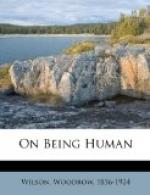view shall have no part in carrying men forward to
a true humanity, shall never stand as examples of
the true humankind. What is truly human has always
upon it the broad light of what is genial, fit to
support life, cordial, and of a catholic spirit of
helpfulness. Your true human being has eyes and
keeps his balance in the world; deems nothing uninteresting
that comes from life; clarifies his vision and gives
health to his eyes by using them upon things near
and things far. The brute beast has but a single
neighborhood, a single, narrow round of existence;
the gain of being human accrues in the choice of change
and variety and of experience far and wide, with all
the world for stage—a stage set and appointed
by this very art of choice—all future generations
for witnesses and audience. When you talk with
a man who has in his nature and acquirements that
freedom from constraint which goes with the full franchise
of humanity, he turns easily with topic to topic;
does not fall silent or dull when you leave some single
field of thought such as unwise men make a prison
of. The men who will not be broken from a little
set of subjects, who talk earnestly, hotly, with a
sort of fierceness, of certain special schemes of
conduct, and look coldly upon everything else, render
you infinitely uneasy, as if there were in them a
force abnormal and which rocked toward an upset of
the mind; but from the man whose interest swings from
thought to thought with the zest and poise and pleasure
of the old traveler, eager for what is new, glad to
look again upon what is old, you come away with faculties
warmed and heartened—with the feeling of
having been comrade for a little with a genuine human
being. It is a large world and a round world,
and men grow human by seeing all its play of force
and folly.
VI
Let no one suppose that efficiency is lost by such
breadth and catholicity of view. We deceive ourselves
with instances, look at sharp crises in the world’s
affairs, and imagine that intense and narrow men have
made history for us. Poise, balance, a nice and
equable exercise of force, are not, it is true, the
things the world ordinarily seeks for or most applauds
in its heroes. It is apt to esteem that man most
human who has his qualities in a certain exaggeration,
whose courage is passionate, whose generosity is without
deliberation, whose just action is without premeditation,
whose spirit runs toward its favorite objects with
an infectious and reckless ardor, whose wisdom is no
child of slow prudence. We love Achilles more
than Diomedes, and Ulysses not at all. But these
are standards left over from a ruder state of society:
we should have passed by this time the Homeric stage
of mind—should have heroes suited to our
age. Nay, we have erected different standards,
and do make a different choice, when we see in any
man fulfillment of our real ideals. Let a modern
instance serve as test. Could any man hesitate




